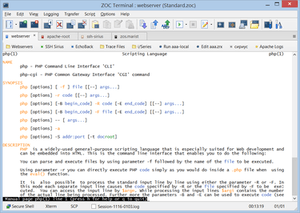ZOC (software)
ZOC is a popular[1][2] computer-based terminal emulator and Telnet software client for the Microsoft Windows and Apple Macintosh macOS operating systems that supports telnet, modem, SSH 1 and 2, ISDN, serial, TAPI, Rlogin and other means of communication. Its terminal emulator supports Xterm emulation with full colors, meta-keys and local printing, VT102, VT220 and several types of ANSI as well as Wyse, TVI, TN3270, and Sun's CDE. It supports full keyboard remapping, scripting in REXX and other languages, and support for named pipes.[3]
 | |
| Developer(s) | EmTec, Innovative Software |
|---|---|
| Initial release | October 12, 1993 |
| Stable release | 7.26.1
/ August 4, 2020 |
| Operating system | Microsoft Windows, macOS |
| Type | Terminal emulator |
| License | Proprietary |
| Website | www |
ZOC is commercial software developed by Markus Schmidt of EmTec Innovative Software in Germany, a firm which produces software for various aspects of communications via telephone, PC, ISDN and the like. Price as of 2018 was about US$80, with a free evaluation period of 30 days; ZOC can be downloaded for evaluation from EmTec or several shareware distribution sites.[1][2] Emtec produce two other associated but independent telecommunications programmes for use over TCP/IP, modem, ISDN etc.: PyroTrans, an FTP package including client and server, and PyroBatchFTP, a programmable FTP tool.
History
ZOC was first released for OS/2 in October 1993 (v0.95) [4] and for Windows in November 1996 (v3.02).[5] In 1997 it was selected as runner-up in the OS/2 e-Zine! Readers' Choice Awards.[6] ZOC released version 3.11 in January 1999. Support for OS/2 was discontinued with the release of version 5. Mac OS X has been supported from version 6.
Features
Protocols
- Secure Shell (SSH V1/V2) based on OpenSSH 6.6 with public/private key authentication, port forwarding (tunneling) and Smart Card support.
- Telnet (RFC-Telnet, pure TCP sockets, SSL-Telnet)
- modem via serial port and TAPI (Windows modem)
- ISDN via CAPI V2.0 (including X.25 and X.31 support)
- Rlogin
- File transfer protocols: ASCII, X-Modem, Y-Modem, Z-Modem, Kermit, SCP
Terminals emulated
Automation
- Scripting
- REXX language for scripting (fully featured programming language with over 75 extensions to control the terminal emulator) — a REXX interpreter is supplied with ZOC, and another interpreter can be specified in configuring ZOC
- AppleScript support with access to all internal script commands on macOS
- recorded login scripts, macro commands, automatic replies on incoming text
- DDE supported in Windows version, allowing ZOC to act as a communication server
User interface
- Tabbed interface for multiple concurrent connections and overview display to show thumbnails of open sessions
- Keys for macros, remappable keyboard, user button bar
- Online chat support
- Configurable display.
See also
References
- Free evaluation version: maximum rating on CNet out of 4 user votes; 75 downloads in week 27 Nov-3 Dec 2011, total to date 75,540
- Free evaluation version: maximum rating for quality on Tucows, relative popularity in the category "Windows-IS/IT-Network administration and protocols-SSH (Secure Shell)" 80%; number of downloads not specified, 3 user reviews
- ZOC website - Features
- History in versions.doc from archive with ZOC v1.00 (zoc100.zip)
- ZOC v3 history
- OS/2 e-Zine! - 1997 Readers' Choice Awards: Business/Productivity Applications